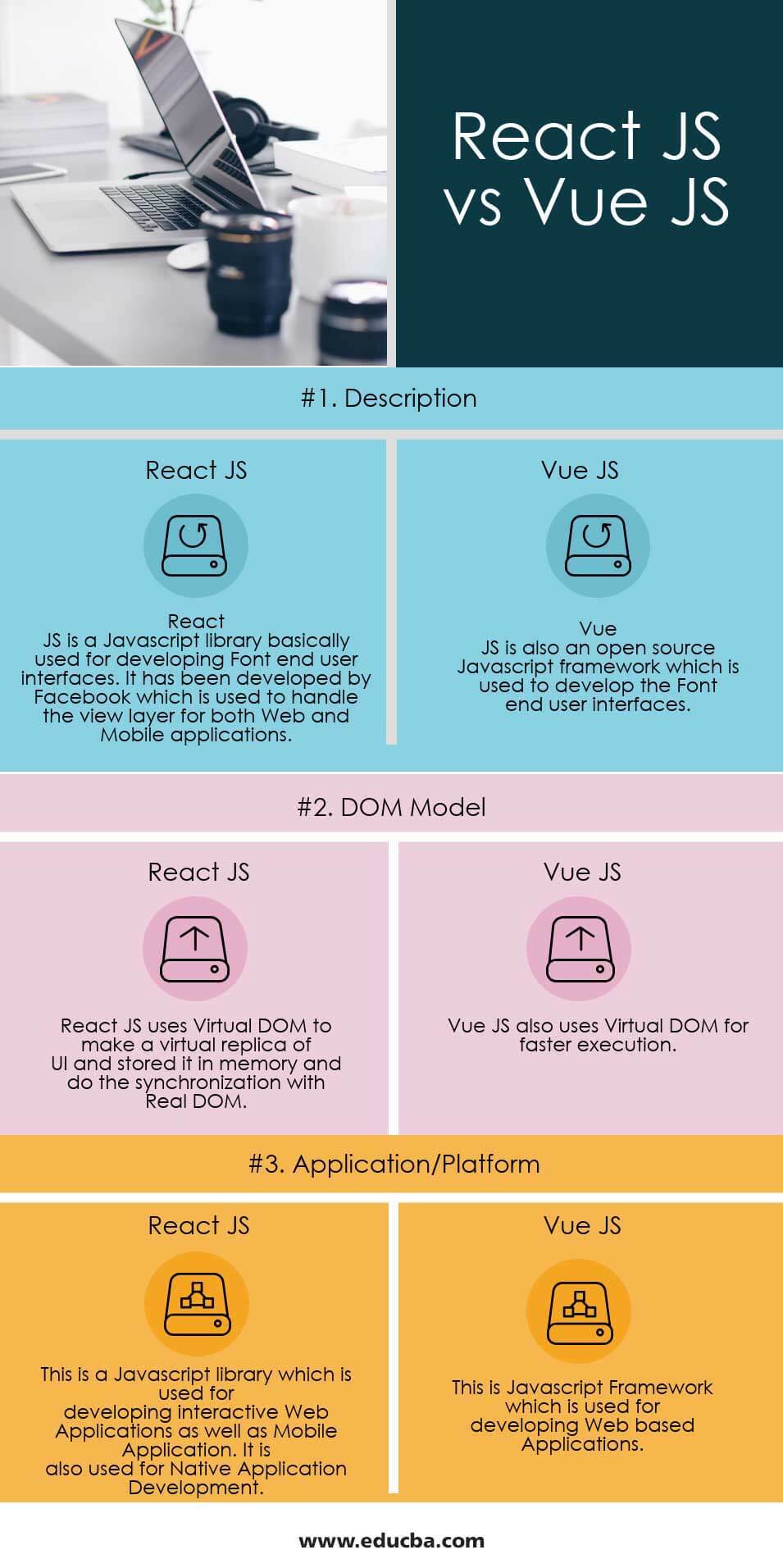
Difference Between React JS and Vue JS
React JS is a Javascript library basically used for developing Font end-user interfaces. React JS has been developed by Facebook, which is used to handle the view layer for both Web and Mobile applications. Javascript, HTML5, and CSS are required to work on the same. This is used to develop reusable UI components. React JS is used as a View part in the MVC model. We can render React JS on a server as a Node and is also used for native application development purposes. React JS actually implements one-way data flow; that is why React JS is much simpler than other commonly used JS frameworks.
What is React JS?
React.js is a JavaScript User Interface library for building UI web pages. For streamlining development and creating efficient user interfaces, many developers utilize React Admin Template. It was developed by Facebook and is maintained by Facebook and a group of community-based developers. It was originally developed by a person named Jordan Walke. It was initially released in the year 2013. It supports cross-platform. It was purely written in the JavaScript language. It is used for the development of Single Page Web Applications and Mobile Apps.
Features of React JS
- JSX: Javascript Syntax Extension, which is mostly recommended to use in React JS.
- Components: React JS is used as a component structure that is used to work on a large project with a different modular structure.
- Unidirectional data flow: It implements a one-way data flow using the Flux pattern to keep the data unidirectional.
- License: It is licensed under Facebook Inc.
What is Vue JS?
Vue JS is also an open-source progressive framework that is used to develop the Font end-user interfaces. Vue JS has been developed by Evan You, an ex-employee of Google. Vue JS is used for developing the front end of interactive Web Applications. It was developed by an individual developer named Evan You. It can be integrated with other UI libraries as well because of its simplified libraries. It was licensed under MIT license. It was initially released in the year 2014. It supports cross-platform. It was purely written in the JavaScript language. It was developed so that it can be integrated with any kind of UI library and is adaptable.
Features of Vue JS
- Templates: Vue JS provides HTML-based templates that will use to create views, i.e. user interfaces. It maintains HTML, CSS, and JS separately.
- Directives: Vue JS uses different in-build directives to perform a different kind of actions.
- Watchers: Watchers are used to taking care of any data-related changes.
- Routing: Vue-router is used to navigate between different pages.
- Vue-CLI: This is used to run Vue JS in the command-line interface.
- Data binding: v-bind is used to assign a value to HTML attributes, manipulate CSS and Style, etc.
- Virtual DOM: This is a programming concept that stores a virtual replica of a user interface in memory and sync with actual DOM using related libraries.
- Animation: Vue JS has its built-in plugins that help to animate different HTML elements.
- Event Handling: v-on attribute is used to listen to different events added to the DOM element.
Head To Head Comparison Between React JS vs Vue JS (Infographics)
Below is the top 3 difference between React JS and Vue JS
Key Differences between React JS and Vue JS
Let us discuss some of the major differences between React JS vs Vue JS
- React JS is a Javascript library that is used to develop different Applications as well as User interfaces. Vue JS is a Javascript MVC Framework that is used to develop a UI layer of Web Applications.
- React JS is used for developing user interfaces of Web Applications and Mobile Applications. Not only this but it is also used for developing Native Applications and also render on Server as a Node. Vue JS is used for developing user interfaces of Web Applications. It basically focused on the view layer. It is also easy to integrate with other Projects and third-party applications.
- React JS is a javascript library; it uses a JSX approach for development. HTML, CSS all need to write in Javascript only. Vue JS is a Javascript MVC framework that uses a template-based approach for development. All HTML, CSS, and Javascript can be used separately in Vue JS, making the development much simpler than React JS.
- In React JS, if any component’s state change occurs, it re-render the entire component hierarchy considering that component as a root component. We need to use PurComponent or implement shouldComponentUpdate to avoid this re-rendering situation whenever needed. In Vue, JS shouldComponentUpdate has been implemented automatically to avoid these re-rendering conditions. Here system knows which component needs to re-render when any state changes occur.
- React JS uses create react app for installation. React JS also needs a web pack for the build.Vue JS uses Vue-cli /CDN/NPM for installation. We can do the development of Vue JS everywhere.
- React JS uses purely core concept Javascript development. Whereas Vue JS uses template-based development. React JS is more popular than Vue JS because Job opportunity in React JS is much with respect to Vue JS.
- State Management Library for React is called MobX, which is very popular in React Community. Whereas State Management Library for Vue is known as VueX.
- Vue.JS has few disadvantages, like Runtime errors in templates which causes hard to debug and handle the errors and thus reduces the high availability of the application, whereas React.js has the feature of boosting productivity and long-term maintenance support with high quality and productivity.
- Vue.JS library has a poor infrastructure library that is still in the developing stage. It needs further improvement to provide a better component system in coding, whereas React.js has greater infrastructure library support and better module bundler packages available that produce better quality applications.
- Vue.JS can be used directly if it knew well before that simplicity is the main concern, then Vue can be simply and directly used, whereas React.js can simply be selected for large and complex applications.
React JS and Vue JS Comparison Table
Below is the list of points that describe the comparison between React JS and Vue JS.
| Basis Of Comparison |
React JS |
Vue JS |
| Description | React JS is a Javascript library basically used for developing Font end-user interfaces. It has been developed by Facebook, which is used to handle the view layer for both Web and Mobile applications. | Vue JS is also an open-source Javascript framework that is used to develop the Font end-user interfaces. |
| DOM Model | React JS uses Virtual DOM to make a virtual replica of UI and stored it in memory, and do the synchronization with Real DOM. | Vue JS also uses Virtual DOM for faster execution. |
| Application/Platform | This is a Javascript library that is used for developing interactive Web Applications as well as Mobile Applications. It is also used for Native Application Development. | This is a Javascript Framework that is used for developing Web-based applications. |
Conclusion React
Both use Virtual DOM for faster execution, which stores virtual UI representation in memory and syncs with Real DOM. As React JS is a Javascript library so all code that contains HTML, CSS, JS needs to write in the Core Javascript concept, which basically uses the JSX approach, whereas Vue JS is a Javascript MVC framework that actually follows the Model View Controller pattern where Vue JS is mainly focused on the View layer.
Vue JS follows a template-based approach that provides HTML-based templates for developing View Layer, i.e., developing User Interfaces. In the case of React JS, it is used for developing Web as Mobile Applications User Interfaces. Moreover, React JS is also used for the development of Native Applications, and also we can render React JS on a server as a Node.
Whereas Vue JS is used for developing interactive User interfaces of Web Applications. According to the current ecosystem and the difference between React JS or Vue JS, React JS is much more popular than Vue JS, offering a wider selection of resources such as React Admin Template to streamline development.
Recommended Articles
This has been a guide to the top differences between React JS vs Vue JS. Here we also discuss the head-to-head comparison, and key differences, along with infographics and a comparison table. You may also have a look at the following articles –

